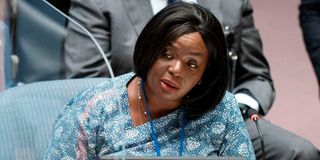UN proposes soldiers fight climate risks

Foreign Affairs CS Raychelle Omamo says climate change is fuelling war in Africa.
Kenya is supporting proposals to have UN peacekeepers granted the mandate to guard against environmental degradation as part of an overall campaign to deal with climate change.
Nairobi’s argument is that climate change is the reason most of the countries in the neighbourhood are fighting, even when the reasons that touched off the conflicts may appear political.
Peacebuilding missions
At the UN Security Council, Kenya’s Foreign Affairs CS Raychelle Omamo said the world must now be “pragmatic” about dealing with conflicts and the impact of climate change, which she argued can directly be linked to the very wars.
“UN peacekeeping and peacebuilding missions especially those in Africa must have clear climate action mandates, including environmental protection and restoration particularly within the sprawling refugee camps within our continent,” she said on Thursday night, during the UN Security Council Open Debate on ‘maintenance of international peace and security: climate and security.
“These missions must also have the ability to collect data especially gender disaggregated data to understand the nexus between women, climate change and conflict.”
Kenya says it is important that peace support missions are enabled to respond to natural disasters such as fires, droughts and floods in changes that will make them overall saviours.
The proposal was not actually Kenya’s, but from Ireland, the chair of this month’s Council Presidency which had put it in a concept note ahead of the second meeting on climate change this year under the UN Security Council. It proposed that the UN should start mandating peacekeeping operations “to assess climate-related security risks and potential responses.”
Ireland’s Prime Minister Taoiseach Micheál Martin had argued that climate change had become destructive for lives, which meant it was now influencing threats to international peace and security. In fact, Ireland admitted that climate change itself was not directly driving conflict but was acting as a “a vector” that fuels those conflicts.
Local security conditions
It cited how climate change limits governments’ ability to respond to crises and called for it to be central to peacekeeping missions if at all the UN could improve local security conditions in areas it operates. In general, the situations in Somalia, where refugees flee due to drought and Al-Shabaab, Lake Chad Basin where stress on available water has pushed conflict, as well as Sudan, Central Africa Republic, and the Democratic Republic of Congo were indicated as areas where climate change had either caused or fueled wars.
Antonio Guterres, the UN secretary-general did agree that climate change and peacekeeping are related, especially when looking at conflicts in Africa, making it harder to resolve them.
“In Somalia, more frequent and intense droughts and floods are undermining food security, increasing competition over scarce resources and exacerbating existing community tensions from which Shabaab benefits,” he said. But there are places where peacebuilding has helped alleviate that.
“For example, in the Lake Chad region, dialogue platforms for cooperatively managing natural resources, supported by the Peacebuilding Fund, have promoted reforestation and improved access to sustainable livelihoods.”
Although all the 15 council members agreed on the role climate change is playing in conflicts, there was an apparent disagreement on whether peacekeeping missions should be handed the mandate
First, it could require a new financial requirement to train the missions or at least have climate-related experts to tag along. Known as the blue helmets, UN peacekeeping missions are often notoriously limited in operation.
In the past, when Kenya fronted the idea of the African Union Mission in Somalia (Amisom) being paid directly like other peacekeeping missions, influential members of the UN system opposed it, fearing it could add financial burden. Amisom, mandated by the UN Security Council is seen as a combat force created by the African Union, different from the blue helmets financed directly from the UN Department of Peace Operations.
On Thursday, China was among the first to reject the idea that peacekeeping missions be environmentalists, even though it agreed that everyone must play a role in safeguarding the environment.
Climate change
“It is worth pointing out that not all of the countries on the Council's agenda were plunged into wars or chaos because of climate change. Nor does the Council have the necessary, specialised knowledge, mechanism or tools to address climate change,” said Zhang Jun, China’s Permanent Representative to the UN.
“We therefore must refrain from using the climate issue as the key to address all problems. We must refrain from including it in the mandate of peacekeeping operations, so as not to impact the Security Council in effectively delivering on its mandate and avoid any unnecessary overlapping of work.”
The Council’s meeting, which also received proposals from environmental activists, came just about 50 days to the next UN climate conference on climate known as Cop 26 in Glasgow, Scotland. It came after the Intergovernmental Panel on Climate Change (IPCC) tabled a report on “physical science basis” of climate change in which it warned that climate change is now a threat to all humans and asked for shared responsibility in dealing with it.
At that meeting, leaders are expected to discuss changed to the Paris Agreement, a 2015 documents that was meant to compel each country to meet their targets on lowering emissions.
The proposal may not be endorsed now, as even the UN Security Council itself is yet to issue a joint call on climate change and security. But Kenya supported is as part of a six-point proposal of its own including that the world listens to its scientists on climate and security links, working through the UN Environmental Programme (UNEP), supporting local safe technologies, supporting local programmes against climate change and developing early warning systems.





